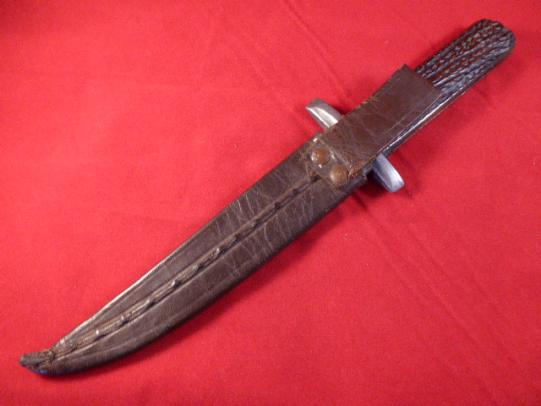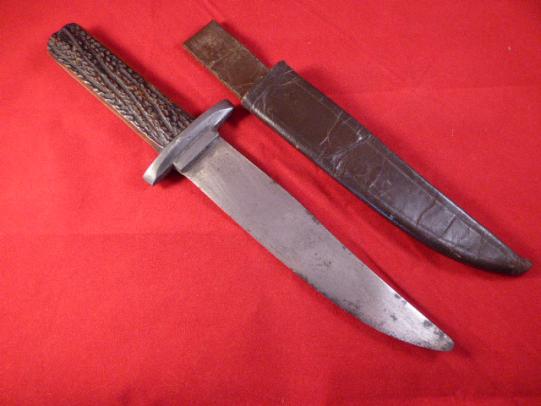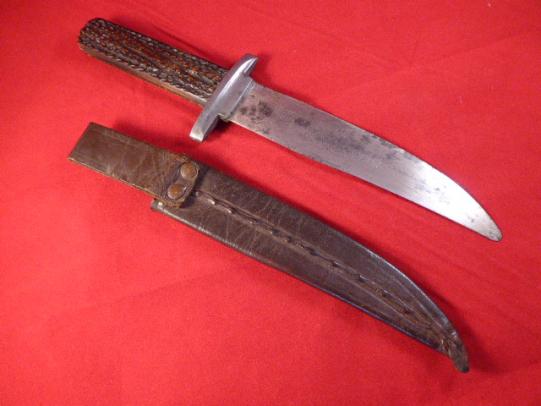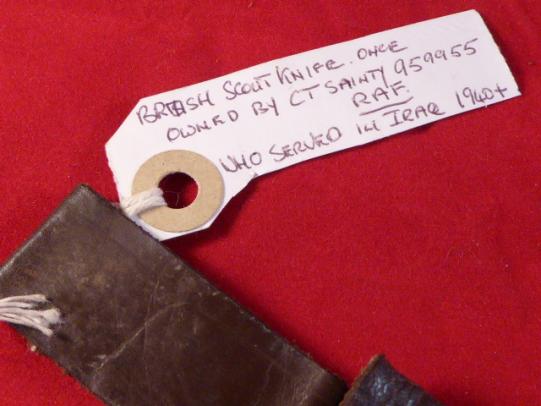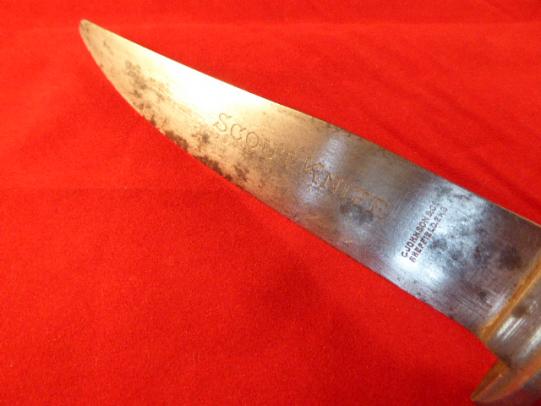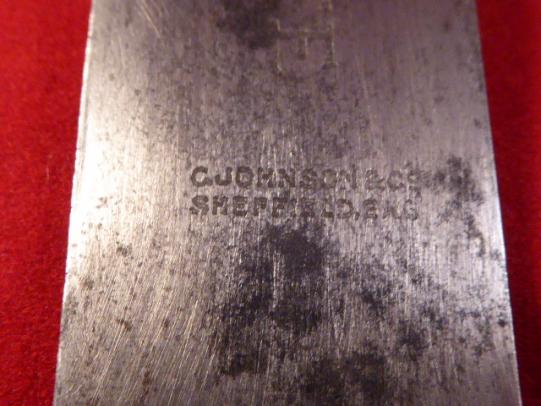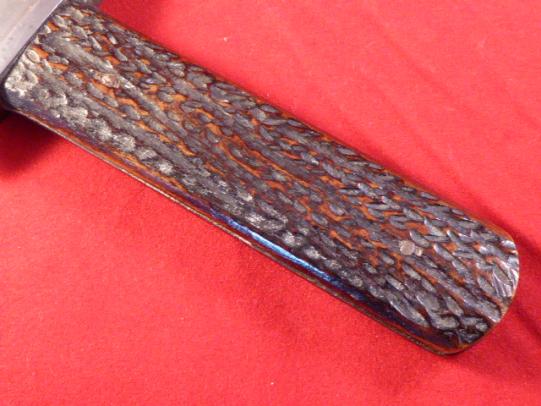Rare Antique Horn Handled Bowie Scout Knife By C. Johnson & Co – Owned By WW2 RAF Chief Technician in 1940
Here on offer is a rare antique but WW2 related, horn handled Bowie Scout Knife that was owned by a RAF Chief Technician, who’s surname was SAINTY and his service number was 959955. He apparently served in Iraq back in 1940.
The old gentleman that I acquired this from years ago had the information about the previous owner on a label that I have left attached for reference.
The beautiful dark horn handle is held in place by two metal pins and has a lovely shiny age patina on both sections of horn.
The handle is fitted to a plain quite crudely made aluminium cross guard.
The thin Bowie shaped blade has some slight greying and a slightly rounded tip, which may have been how it was made? The centre of the blade is clearly stamped with SCOUT KNIFE and it has a makers name stamped by the throat, which reads:
C.JOHNSON & Co SHEFFIELD, ENG
Christopher Johnson, who was born in Sheffield in about 1809, started his cutlery business (according to a trade catalogue) in 1836 in Howard Street, Sheffield. His early career, however, is obscure and the firm did not appear at the in Western Works in Howard Street until 1854, with an outlet in Hatton Garden, London. Western Works was apparently so named because of Johnson's flourishing trade in the south-western counties of England. In 1859, he relocated to Portobello Street, which was to be the centre of the firm's operations well into the twentieth century. Johnson was essentially a merchant: but he listed himself as a steel converter and refiner, and a 'manufacturer' of files, tools, and a complete range of cutlery (including table and pocket knives).
Johnson soon developed a liking for country life, partly one suspects because his business was so profitable. He brought new partners into the business, such as his nephew John Hibbert (c.1832-1908). In 1868, another partner, John Marshall, joined the business, and the title '& Co' was added. By 1871, Christopher Johnson had moved to The Grange, Carlton, Nottinghamshire, and withdrew from the partnership with Hibbert and Marshall in 1879. Johnson died at The Grange on 2 May 1881, aged 72, after 'a lingering illness'.
Marshall and Hibbert now took over the business. In 1881, the firm employed 200 workers(according to Hibbert's enumeration in the Census). Hibbert himself retired from the firm in 1886 (he died, aged 77, on 1 June 1908, and was buried in Fulwood).
Marshall became the owner of the business in the late nineteenth century, when the company operated at Western Works and Western Steel Works in Portobello, with a London agent in Victoria Street, London.
Sheffield City Library Local Studies Collection has several trade catalogues and manuscript letter-books for this firm. These show almost every type of cutlery from table knives to hunting knives. A Johnson sample book, probably pre-1914, has photographs of sportsman's knives and farmers' knives. Hafted in buffalo, ivory and stag, the quality is self-evident. Many of these products were exported. Johnson, Hibbert and Marshall described themselves as 'Australian merchants'. In 1880, Johnson's won a gold medal at the Melbourne International Exhibition and then appointed an Australian agent, J. W. Bunby, who developed a flourishing trade in the 1880s and 1890s for Johnson's table cutlery and pocket knives. Besides steel and files, the firm sold plated-ware and registered silver marks in Sheffield in 1890 and 1903. Johnson's trade mark - a flag enclosing his initials - was also well known in South Africa, where the firm won a gold medal at the Kimberley Exhibition in 1892. At the turn of the century, Johnson's were hard pressed to satisfy the demand from these markets.
John Marshall died on 6 April 1915, at his residence Woodville, in Broomhall Park. He was aged 78 and was buried in Ecclesall. An extensive obituary in The Sheffield Daily Telegraph, 8 April 1915, discussed his work as chairman of the board of Sheffield Royal Infirmary, but hardly mentioned his business career. Marshall's son-in-law, J.M. Denton, took control of the firm and extended its trade in New Zealand.
Christopher Johnson & Co. continued to trade in the early 20th century. It had become a limited company by 1939. But after 1945, the decline of its overseas markets, particularly Australia, hit Western Works hard. In 1955, it was bought by Wostenholm and Johnson's factory was closed.
It still retains its brown leather scabbard, which has a belt loop at the top and is in great condition.
In its scabbard it measures 10.25” (26cm) long and weighs 157g.
The knife blade measures 5.5” (14cm).
Please see my TERMS OF BUSINESS regarding Deliver Charges and Insurance regarding additional insurance cover, should you require it, BEFORE the item is dispatched.
Code: 50012

